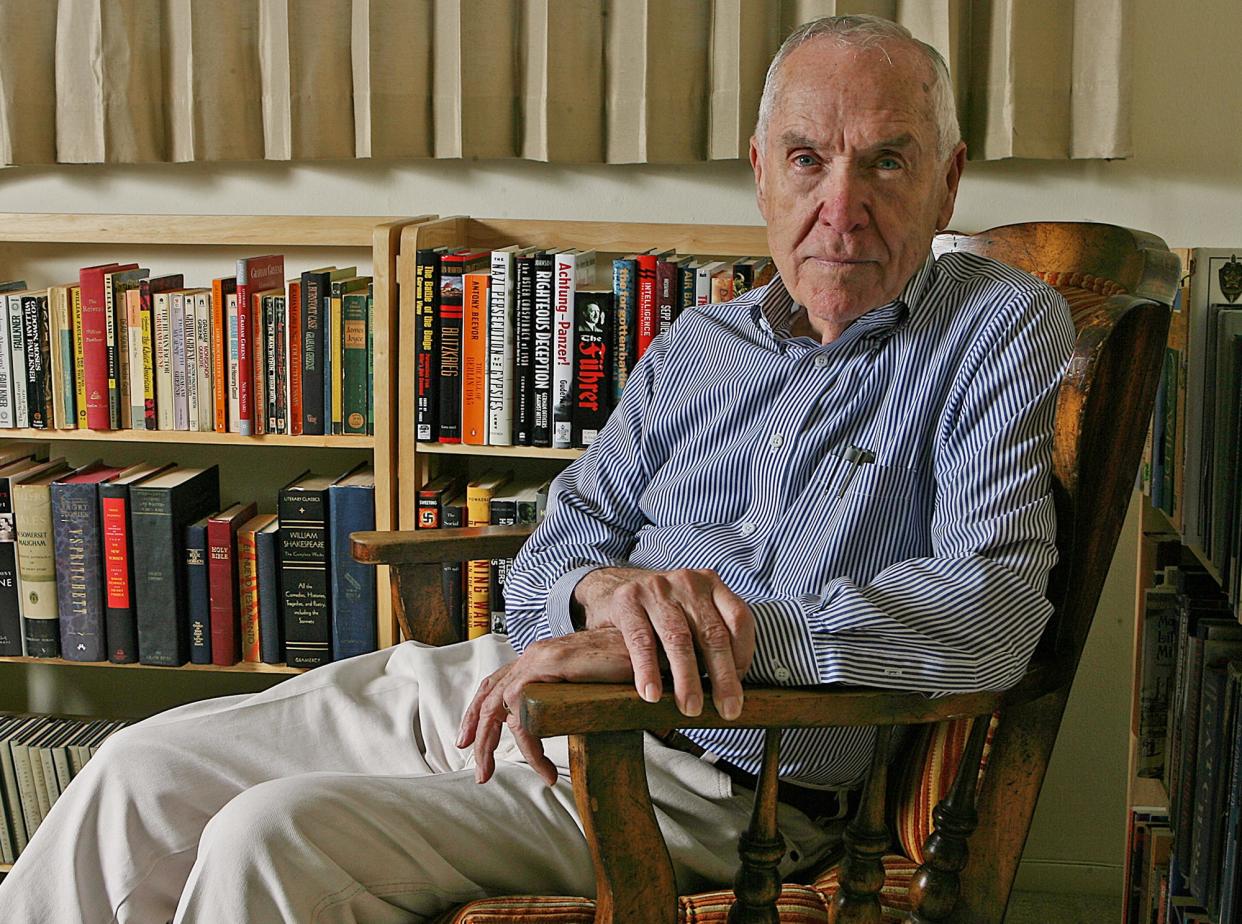Acclaimed Austin author and professor Rolando Hinojosa-Smith, 93, has died

- Oops!Something went wrong.Please try again later.
- Oops!Something went wrong.Please try again later.
Austin author and professor Rolando Hinojosa-Smith, who shared the ways of the Rio Grande Valley with the rest of the world, died in a Cedar Park care home Tuesday. He was 93 and had suffered from dementia.
"Rolando Hinojosa-Smith was a friend, mentor and inspiration for me," said Sergio Troncoso, president of the Texas Institute of Letters and author of "Nobody's Pilgrims." "His 'Klail City Death Trip' series is a classic that everyone in Texas and beyond should read."
The "Klail City Death Trip" series centers on a fictional county in the Lower Rio Grande Valley. It was published in 15 volumes from 1973 to 2006. Hinojosa-Smith wrote sometimes in English and often in Spanish, and he translated his own books.
"His brilliance in making language sing in full color the voice of the people of South Texas — in English, Spanish or Tex-Mex — enriched our world," said Carmen Tafolla, former Texas State Poet, past president of the Texas Institute of Letters and professor emeritus at the University of Texas at San Antonio, "and his warmth, wickedly playful sense of humor and literary talents will leave a huge gap in our community."
Hinojosa-Smith was born Jan. 21, 1929, in Mercedes, the son of Manuel Guzman Hinojosa and Carrie Effie Smith. He was a veteran of the Korean War. He attended the University of Texas, where he later became a professor of English, and New Mexico Highlands University. Hinojosa received a Ph.D. from the University of Illinois Urbana-Champaign in 1969.
More: Texas History: The Rio Grande is 'The River That Runs Through Me'
He is survived by his children Robert Huddleston, Clarissa Hinojosa and Karen Hinojosa, as well as by his daughter-in-law Kathi Huddleston and his grandsons Ryon and Cory.
"Growing up, there were always — and I do mean always — books stacked in every room," said daughter Karen Hinojosa, a former digital content producer for the American-Statesman. "He once said he didn't care what my sister and I read as long as we were reading. We always had library cards, and books were a given at Christmas and birthdays."
She said her father loved the opportunities to travel that came with his career as a writer and teacher.
"He taught himself German — he already spoke fluent English, Spanish and Portuguese," Hinojosa said. "He loved any question about language that my siblings or I could throw at him, and he was a stickler for grammar but loved a creative use of slang.
"We had a tradition where, after the first day of each semester, I'd call and ask about his new ‘kids,’” Hinojosa continued. "He was always enthusiastic and hopeful about them. I think he was a bit of a throwback in the classroom. He believed respect went both ways: If the students were going to call him Dr. Hinojosa-Smith, then he was going to call them Mr. or Ms."
John Morán González, the J. Frank Dobie Regents Professor of American and English Literature at UT, said Hinojosa-Smith was the consummate "writer's writer."
"Just as William Faulkner plumbed these depths in his Yoknapatawpha County chronicles, Hinojosa-Smith told (South Texas) stories, often in two languages, with a keen wit and genuine compassion to give us an essential part of the story of Texas," González said. "He was UT’s link to the grand tradition of 20th-century writing that not only included Faulkner but also the great 'Boom' writers of Latin America, including Gabriel García Márquez, with whom he had deep ties.
More: 'Between two worlds': A fantastic new anthology spotlights Mexican American literature
"In short, he wrote at the crossroads of the Americas as a reflection of Texas’ past, present and future."
Poet Tafolla first met Hinojosa-Smith in 1975 when Chicano writers gathered from across the country at the Festival Floricanto, a three-day event that featured dozens of emerging Mexican-American poets and writers.
"His readings were an instant hit for their depth, cultural power and linguistic richness," she said. "The last remaining survivor of the trio of Premio Quinto Sol winners who defined the front wave of a pioneering generation of Chicano literature and an early Chicano literary movement, his work was of huge significance in breaking down racist stereotypes about Mexican Americans."
Steven L. Davis, literary curator of the Wittliff Collections at Texas State University in San Marcos, believes that Hinojosa-Smith's writing stands out as some of the most consequential in Texas literature.
"He had such a lively, penetrating mind and a consuming curiosity about the world around him," Davis said. "He befriended so many writers and made each of us feel as though we shared a special kinship with him. I loved him, as did many others. He made such a positive impact in his lifetime. We dearly miss him, and we will cherish his spirit, which continues to sustain us."
More: Josefina Zamarripa, mother of 14, raised her children while advocating for East Austin
Memorial plans are in the works for the week of May 16 at Weed-Corley-Fish Funeral Homes on Parkcrest Drive.
"I forget, sometimes, his impact," daughter Karen Hinojosa said. "We're hearing from friends, colleagues and former students from all over. He taught and inspired a lot of people. I've met people on my own travels who knew him, and even years after they'd left UT, they'd still gush about him.
"It always — will always — fill me with pride, that people held him in such high regard. Even though he helped push Latino literature into the mainstream, and received countless awards and honors, at home, he was always Daddy."
This article originally appeared on Austin American-Statesman: Acclaimed Austin author, professor Rolando Hinojosa-Smith has died

